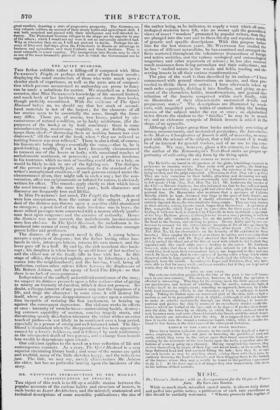THE QUIET III:SBAND.
THIS fiction exhibits rather a falling-off if compared with Miss PICKERING'S Fr/Wit, or perhaps with some of her flintier novels ; displaying the usual mannerism of those who write much upon a slender stock of experience, as well as the mere arts of composi- tion which persons accustomed to authorship arc prone to limey can be made a substitute for matter. We remarked on a former occasion, that Miss PICKERING'S knowledge of life seemed limited, and much both of her incidents and pet-sons drawn from books, though probably recombined. With the evidence of The Quiet Husband before us, we should say that her stock of second- hand materials is not of the largest ; for the elements of all her stories seem to be essentially the same, though the 1brms may differ. There are, of course, two lovers, parted by cir- cumstances of natural condition, or by lucky misfortune, (for the purposes of the book,) or by both combined : there is some misunderstanding, contretentps, stupidity, or fine feeling, which keeps them aloof—" distressing them as nothing human was ever distressed," till the end of the book, when " they are relieved as nothing human was ever relieved." There is also a rival, of course; his lineaments being always essentially the same,—that is, he is good-looking; wealthy, if not a lord; favourably circumstanced to torment one of the lovers or both ; with occasional touches of melodramatic sentiment, or generosity ; and a positive insolence in his tantrums, which no man of breeding could offer to a lady, or would he likely to risk to one of the fighting sex. The dialogue of the persons is generally just, according to the standard of the writer's metaphysical creations,—if such persons existed under the circumstances given, they might talk in such a way ; but the con- versation, often too epigrammatic or inflated for nature, is obviously written for effect. The remarks apply chiefly to that which forms the woven interest : in the more level parts, both characters and discourse are frequently true and lifelike.
In Miss PICKERING'S last novel, The Fr4rht, the faults spoken of were less conspicuous, from the nature of the subject. A good deal of the distress was thrown upon a sensitive child abandoned to strangers; a good deal of the male insolence was in boys ; the more stilted passages were connected with a morose elderly gentle- man bent upon vengeance and the exercise of authority. Hence the distress was more natural, the melodramatic inconsistencies were less obvious. In The Quiet Ha..,1,ond, the melodrama is in- troduced into scenes of every-day life, and the insolence amongst grown ladies and gentlemen. The distress of the present novel is this. A young heiress accepts a captain of dragoons ; but the father having other hue. bands in view, intercepts letters, returns his own answer, and the lover goes off in a huff. By and by, the rich merchant dies bank- rupt ; his daughter is taken home by an old lover of her mother's; and the eldest son of the tinnily falls in love with her. In this stage of affairs, the rejected captain, grown by inheritance a lord, comes into the neighbourhood ; and the heroine, Cecil, being all perfection, various other suitors follow her—to the displeasure of Mr. Robert Ashton, and the agony of Lord Fitz Elwyn : so that there is no lack of cross-purposes.
Independent of the unlikely and artificial contrivance of the story,
we suspect its distress proceeds upon a lidse notion—that of giving to misery an intensity of duration, which it does not possess. No doubt, a disappointment of any passion may mar the happiness of a life, and tinge the character : in some cases it will destroy life itself, where a grievous disappointment operates upon a constitu- tion incapable of resisting the first excitement, or bearing up against the consequent depression. But violence works its effects at once : intensity of wretchedness—undermining health, destroy- ing common equability of manner, causing tragedy starts, and threatening speedy dissolution whenever the writer wishes an extra touch of pathos—is not likely to be continued over a long period, especially in a person of strong and well-balanced mind. The like- lihood is diminished when the disappointment has been apparently caused by a lover's fickleness, and is followed by such misfortunes as the unexpected death of two parents, and a change floes bound- less wealth to dependence upon friends.
Our criticism applies to the novel as a true reflection of life and
contemporary manners. As a story, The Quiet husband is a very superior circulating library book ; and scene of the scenes are quiet and truthffil, many of the little sketches happy, and the reflections just. The title, we may say, merely characterizes Mr. Ashton the elder, but has no pesticides bearing upon the incidents of the story.


























 Previous page
Previous page